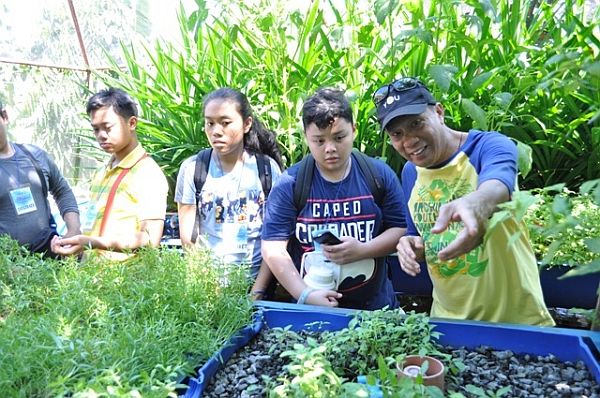
Former Cebu City councilor Nestor Archival explains to participants of the Metropolitan Cebu Water District (MCWD) Ecotour how his aquaponics garden works.
contributed photo
EARTH MONTH
Children of Metropolitan Cebu Water District (MCWD) employees and youth leaders from the different schools that are members of the United Nations Educational, Scientific and Cultural Organization (Unesco) clubs in Cebu participated in an ecotour organized by MCWD last April 25 as part of the Earth Month celebration.
There were 35 participants — 19 kids of MCWD employees and 16 youth leaders.
The participants first visited the Septage Treatment Plant (STP) in Barangay San Miguel, Cordova, Cebu, where they were briefed about the importance of septage management by treating wastes from septic tanks. The participants were also taught about the things that they can do at home to save water.
From the treatment plant, the participants proceeded to the Archival Ecohouse in Barangay Talamban, Cebu City.
Former Cebu City councilor and environmentalist Noel Archival, who owns the place, toured the participants around the 7,000-square-meter property. Archival showed to them his solar panel system that produces about 10,000 kilowatts of power every day. Archival said he used to pay P25,000 a month to the Visayan Electric Company (Veco) for his electricity bill. But with the solar panels, he said he does not spend a single centavo anymore for his electrical consumption, and he even shares electricity to his less-privileged neighbors.
Archival also showed his aquaponics garden, a combination of soilless planting and fish-raising. He waters the plants using water with fish waste.
Archival also keeps goats in his compound and he feeds them vegetable wastes from the market. The wastes of the goats are then kept in a septic tank. Together with human wastes, the waste materials are processed to become fuel which is used in cooking.
The property also houses a brick-making facility. Nonbiodegradable wastes are shredded and then mixed with cement using a machine to produce solid bricks.
Archival also practices vermi composting where biodegradable materials like fruits and vegetables are shredded and mixed with sawdust and manure and placed in worm beds.
Archival also teaches wood work for free. He collects scrap wood and these are made into benches, trays, tables and other wood furniture.
The Ecohouse also has crocodiles, fishes, birds and a Burmese python.
After the tour, the children were asked what they learned from the activity, and those who first gave their answer were given prizes.
Each participant got a certificate of participation and an MCWD face towel. /pr